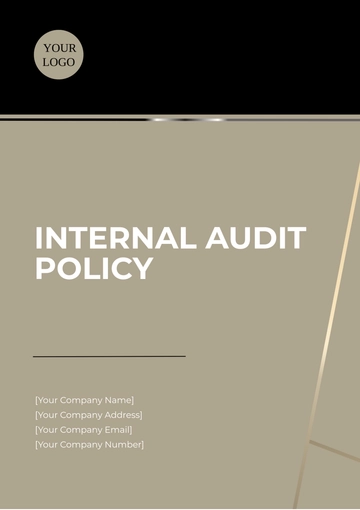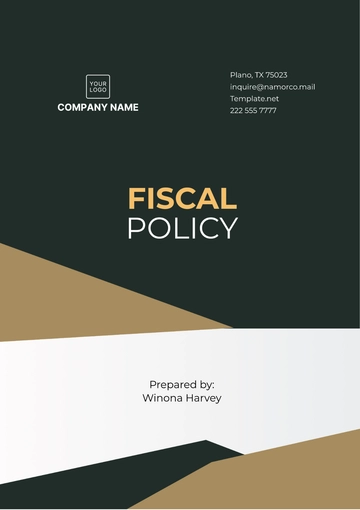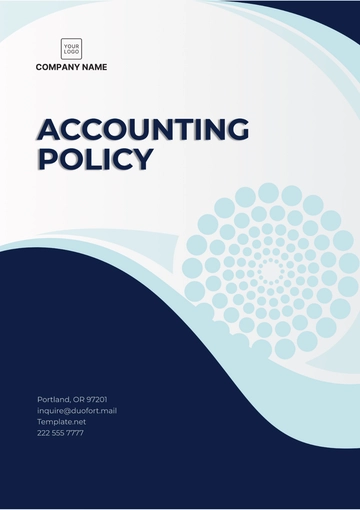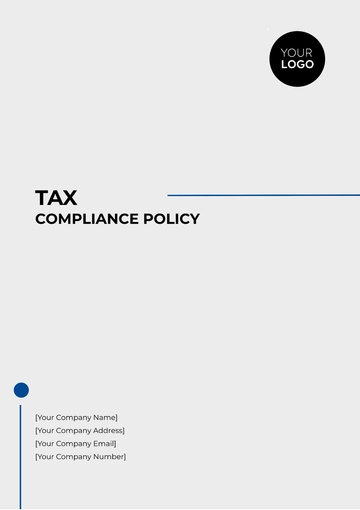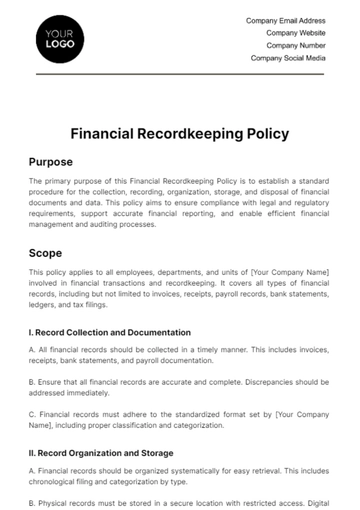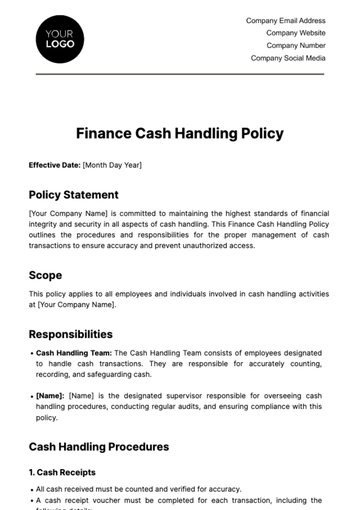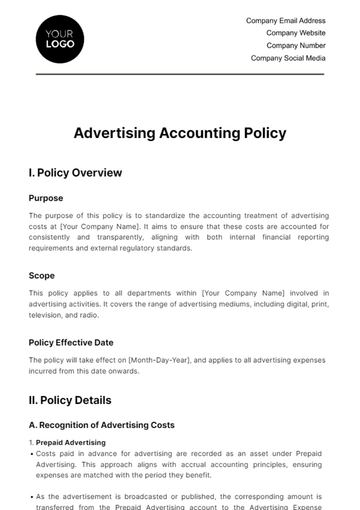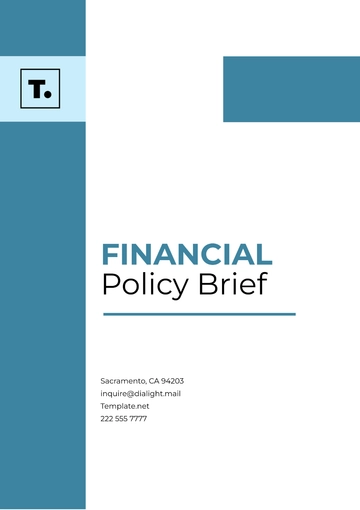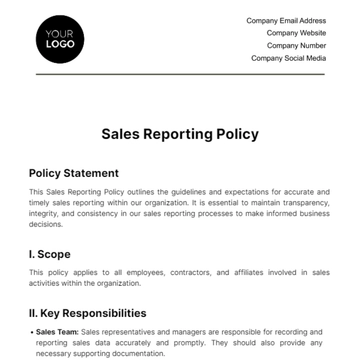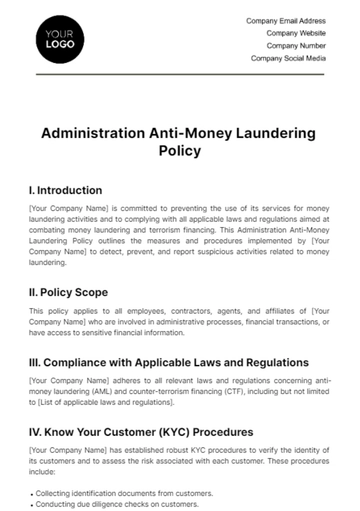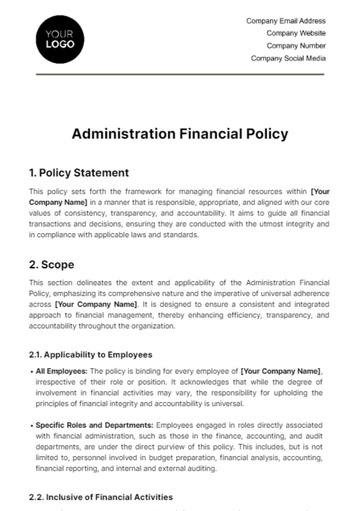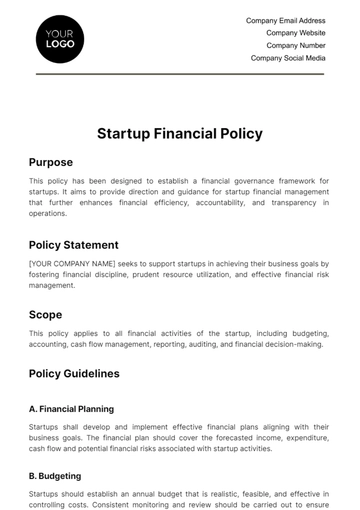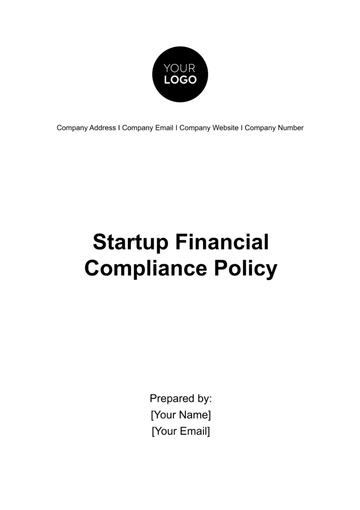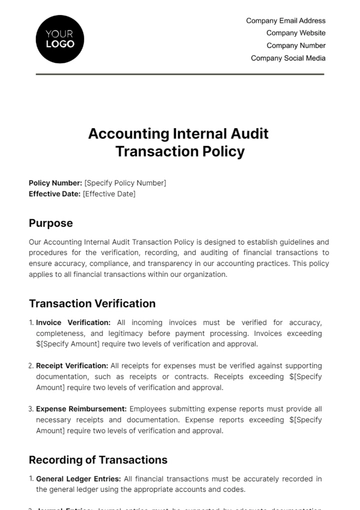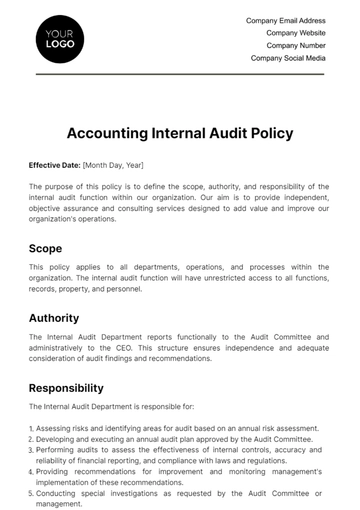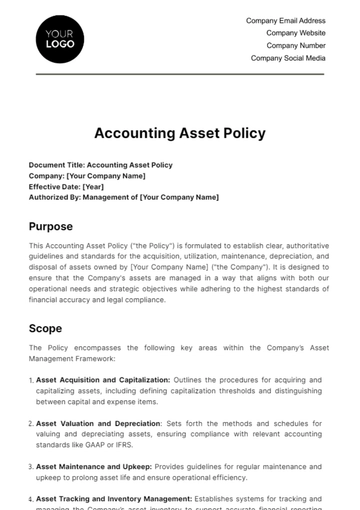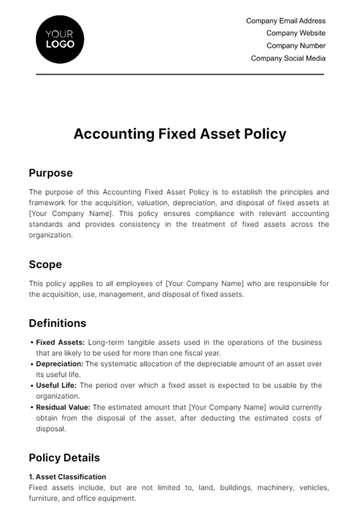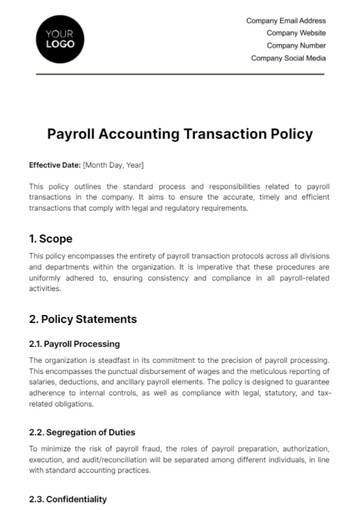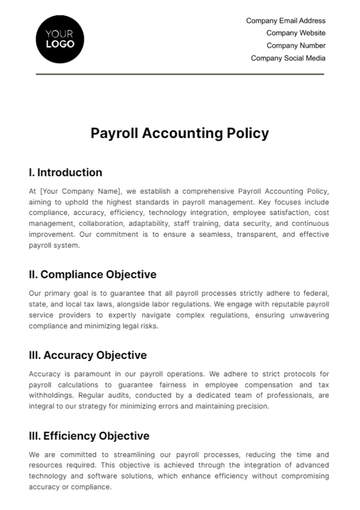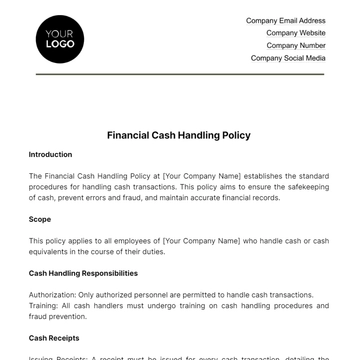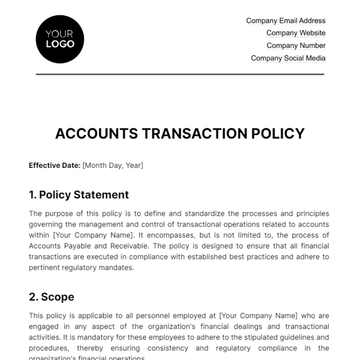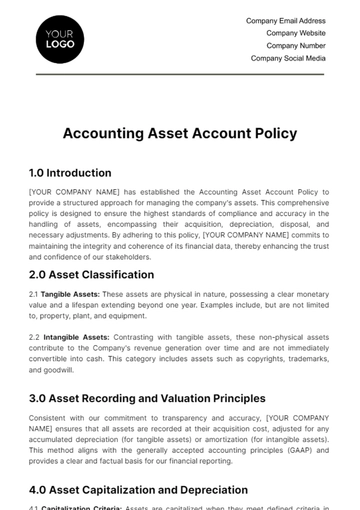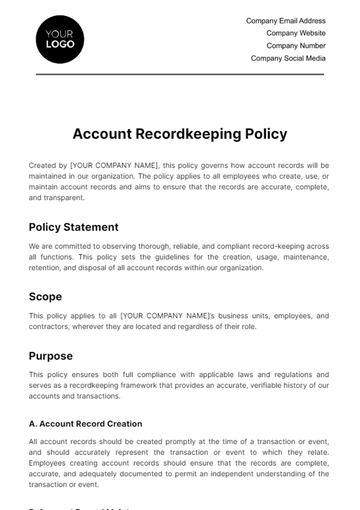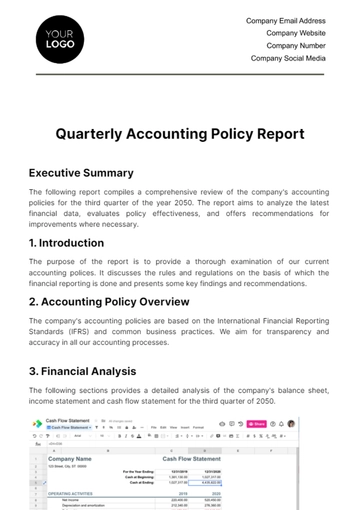Free Startup Financial Compliance Policy
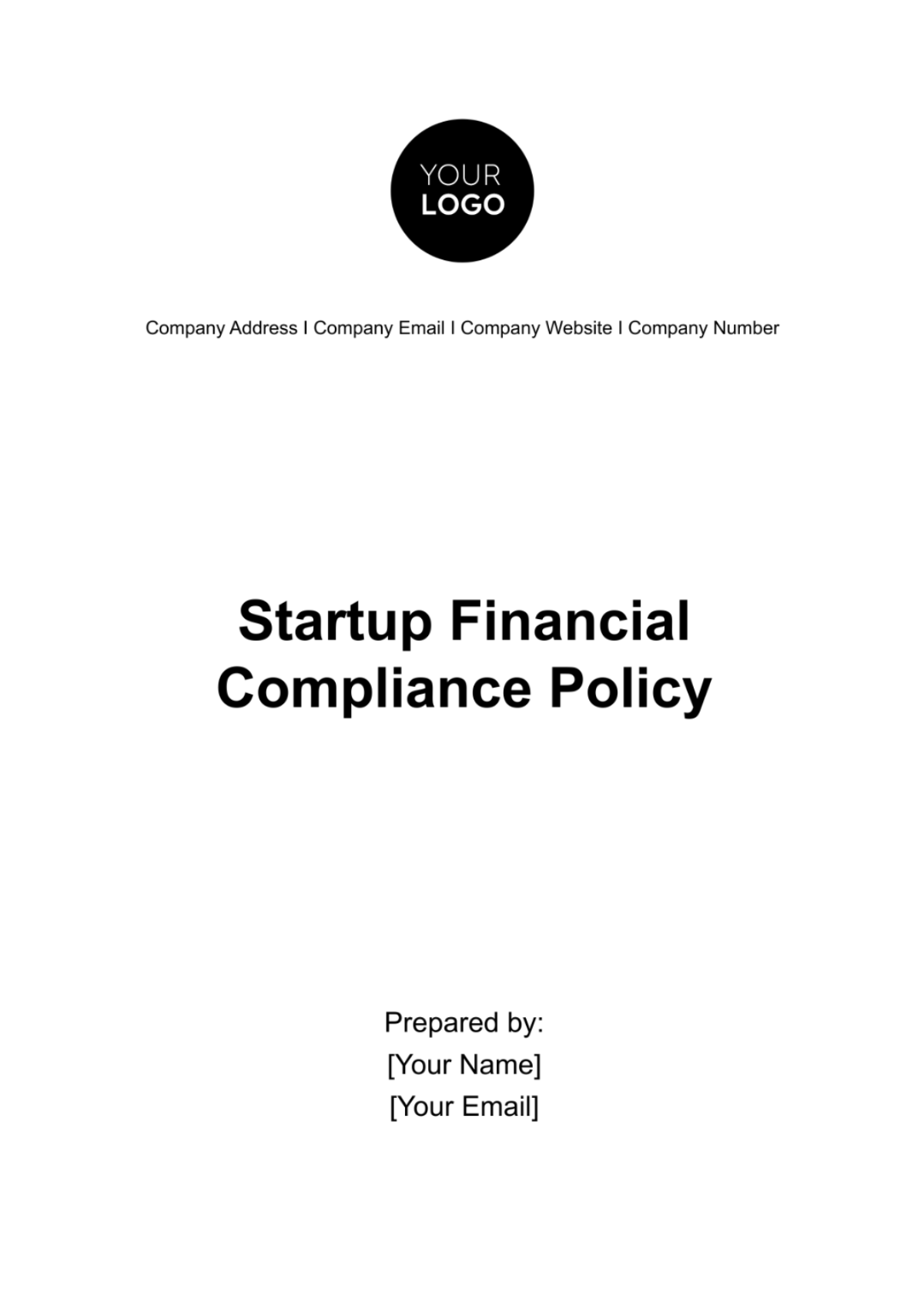
I. Introduction
In the ever-evolving landscape of [Industry], [Your Company Name] has crafted this document to articulate the foundational principles of our startup's financial compliance policy. As we venture into this dynamic realm, it becomes imperative to establish a robust framework that ensures not only the meticulous management of financial resources but also steadfast adherence to regulatory standards and legislation. This policy serves as a beacon, guiding our team members in navigating the intricacies of financial governance within a startup environment. By championing exceptional governance and standardized financial practices, we aim to fortify our commitment to integrity and transparency. Through this policy, [Your Company Name] paves the way for a financial ecosystem that not only meets regulatory requirements but also fosters an environment conducive to sustained growth and innovation.
II. Policy Objective
As the guiding force behind our financial practices, the policy sets forth four core objectives:
Promoting Financial Integrity: This policy aims to instill a culture of financial integrity within [Your Company Name], ensuring that every financial transaction is conducted ethically and transparently. By fostering a commitment to accuracy and honesty, we lay the foundation for trust among stakeholders and partners.
Ensuring Regulatory Compliance: [Your Company Name] is dedicated to upholding the highest standards of regulatory compliance. This objective underscores our commitment to aligning our financial practices with relevant laws, regulations, and industry standards. Through rigorous adherence, we mitigate risks and position ourselves as a responsible player in the [Industry] landscape.
Facilitating Transparent Financial Management: Transparent financial management is paramount to [Your Company Name]'s success. This objective emphasizes the need to provide stakeholders with clear, accurate, and timely financial information. By establishing robust reporting mechanisms, we empower decision-makers with the insights necessary for strategic planning and informed choices.
Mitigating Financial Risks: [Your Company Name] recognizes the importance of proactively identifying and addressing financial risks. This objective focuses on implementing measures to identify, assess, and mitigate potential risks that could impact our financial stability. By fostering a risk-aware culture, we fortify our resilience in the face of uncertainties, safeguarding the long-term viability of the startup.
III. Scope of the Policy
As the cornerstone of the financial governance at the startup, this policy encompasses all members of the startup ecosystem, including owners, employees, contractors, volunteers, and interns. The policy underscores the collective responsibility towards maintaining financial probity, addressing critical aspects such as internal control frameworks, financial reporting, corporate governance, tax compliance, and fraud prevention. It serves as a comprehensive guide for every individual associated with the startup.
Within this scope:
Internal Control Framework: The policy emphasizes the establishment of an effective internal control system. This includes safeguarding the startup's assets, ensuring the reliability of financial information, and assuring compliance with relevant laws and regulations. Cultivating a robust internal control environment fortifies the startup against potential risks and enhances overall operational efficiency.
Financial Reporting Standards: The startup is committed to maintaining high standards in financial reporting. This involves preparing and presenting financial reports in accordance with generally accepted accounting principles (GAAP) and/or International Financial Reporting Standards (IFRS). Periodic internal audits ensure the continual quality of financial reports, reinforcing the startup's commitment to transparency and accuracy.
Fraud Prevention and Detection: Proactively addressing fraudulent activities, the startup strives to establish an effective internal control system, a whistle-blower policy, and fraud detection mechanisms. These measures, including the segregation of duties and regular data analytics for anomaly detection, contribute to creating a secure environment. Encouraging transparency and providing avenues for reporting, the startup stands resilient against potential fraudulent activities.
Tax Compliance: In alignment with local, state, and federal tax laws, the startup is dedicated to ensuring timely and accurate tax filings. This objective extends beyond mere compliance, incorporating educational initiatives for employees. Conducting annual tax compliance workshops enhances awareness, instilling a sense of responsibility regarding the implications of tax compliance and non-compliance among the workforce.
IV. Financial Governance and Control
A. Internal Control Framework
An effective internal control system is paramount for the startup, aiming to safeguard its assets, ensure the reliability of financial information, and assure compliance with relevant laws and regulations.
Table 1: Internal Control Framework Details
Control Element | Details |
|---|---|
Access Controls | Role-based access assigned to employees based on job roles |
Segregation of Duties | Clear separation between individuals authorizing and processing transactions |
Physical Controls | Restricted access to financial storage areas |
IT Security Measures | Regular password updates and two-factor authentication |
Audit Trail Systems | Electronic tracking of changes to financial records |
The implementation of a robust internal control system involves multiple facets. Role-based access, as a control element, ensures that employees are granted specific permissions aligned with their job roles. This strategic approach minimizes the risk of unauthorized access, enhancing overall security. The clear segregation of duties establishes distinct responsibilities, preventing conflicts of interest and reducing the potential for fraudulent activities.
Physical controls, such as restricted access to financial storage areas, contribute to the overall security posture, safeguarding tangible assets. The inclusion of IT security measures, such as regular password updates and two-factor authentication, adds a layer of protection to sensitive financial data in the digital realm. The electronic tracking of changes through audit trail systems ensures transparency and accountability, crucial for maintaining the integrity of financial records.
The internal control framework is foundational for the startup's financial governance, aligning with industry best practices to mitigate risks, prevent fraud, and uphold the principles of transparency and accountability. By implementing these measures, the startup not only fulfills regulatory requirements but also establishes a robust foundation for responsible financial management and sustainable growth.
B. Financial Reporting
Financial reports at the startup are prepared and presented in accordance with generally accepted accounting principles (GAAP) and/or International Financial Reporting Standards (IFRS). The startup ensures periodic internal audits to maintain the quality of financial reports.
Table 2: Financial Reporting Details
Reporting Aspect | Detail |
|---|---|
Reporting Standards | Compliance with GAAP and/or IFRS |
Internal Audit Frequency | Monthly internal audits for report quality |
Financial Performance Metrics | Key performance indicators (KPIs) tracked regularly |
External Audit Arrangements | Annual external audit engagement |
Data Accuracy Protocols | Periodic data reconciliation and verification |
The adherence to reporting standards such as GAAP and/or IFRS ensures that the startup's financial presentations align with globally recognized accounting principles. Internal audit frequency, detailed as monthly audits for report quality, reflects a proactive commitment to ensuring the accuracy and reliability of financial information.
The incorporation of financial performance metrics, with regular tracking of key performance indicators (KPIs), allows for a dynamic assessment of the startup's financial health. External audit arrangements, through an annual engagement, provide an additional layer of validation and scrutiny, reinforcing the reliability of financial reports. Data accuracy protocols, involving periodic reconciliation and verification, further contribute to the overall precision and trustworthiness of financial data.
These meticulous measures within the financial governance and control framework exemplify the startup's commitment to transparency, accuracy, and compliance in its financial operations. Establishing and adhering to these standards not only ensures regulatory compliance but also cultivates trust among stakeholders. The startup's dedication to robust internal controls and meticulous financial reporting sets the stage for sustainable growth and instills confidence in the integrity of its financial practices.
V. Fraud Prevention and Detection
Fraud prevention and detection are integral components of the startup's commitment to maintaining a secure financial environment. The following steps outline the comprehensive approach adopted by the startup in addressing and mitigating the risks associated with fraudulent activities:
A. Establishing an Effective Internal Control System
Risk Assessment: The startup conducts regular risk assessments to identify potential areas vulnerable to fraudulent activities. This involves a thorough analysis of internal processes, potential loopholes, and external factors that may pose risks.
Segregation of Duties: To minimize the risk of fraudulent activities, the startup enforces a segregation of duties. This ensures that critical tasks are divided among multiple individuals, preventing any single person from having unchecked control over a process.
Internal Audits: Regular internal audits are conducted to assess the effectiveness of the internal control system. This proactive measure allows the startup to identify and rectify any weaknesses or gaps in the system, enhancing overall resilience against fraud.
B. Whistle-Blower Policy Implementation
Anonymous Reporting Mechanism: The startup implements a whistle-blower policy that includes an anonymous reporting mechanism. This empowers employees to report suspicious activities without fear of retaliation, fostering a culture of transparency and accountability.
Incident Response Team: The startup establishes an incident response team dedicated to handling reports received through the whistle-blower policy. This specialized team ensures prompt and thorough investigations into reported incidents, maintaining the integrity and effectiveness of the policy.
C. Fraud Detection Mechanisms
Regular Data Analytics: Leveraging advanced data analytics tools, the startup performs regular analyses of financial data to identify anomalies or patterns indicative of fraudulent activities. This proactive approach enhances the chances of detecting irregularities in a timely manner.
Continuous Monitoring Systems: Implementing continuous monitoring systems, the startup ensures real-time oversight of financial transactions. This ongoing surveillance allows for immediate detection and response to any suspicious activities, bolstering the overall effectiveness of the fraud detection mechanisms.
External Audits: The startup engages external audit services periodically to conduct independent assessments of its financial processes. External audits provide an additional layer of scrutiny and contribute to the validation of the effectiveness of internal fraud detection mechanisms.
D. Legal Compliance and Consequences
Legal Consequences for Non-Compliance: Emphasizing the seriousness with which fraudulent activities are handled, the startup outlines legal consequences for non-compliance. This serves as a deterrent and reinforces the commitment to maintaining the highest ethical standards.
Awareness Programs: The startup invests in ongoing training and awareness programs to educate employees about the various forms of fraud and how to recognize and report suspicious activities. This proactive measure contributes to building a vigilant and informed workforce.
VI. Tax Compliance
The startup is committed to ensuring the timely filing of taxes in strict adherence to local, state, and federal tax laws. This dedication reflects our commitment to meeting legal obligations and avoiding potential penalties associated with non-compliance.
Table 3: Tax Compliance Details
Tax Compliance Aspect | Detail |
|---|---|
Filing Timeliness | Quarterly tax filings |
Compliance Education | Annual tax compliance workshops for employees |
Record Keeping Practices | Systematic organization of tax-related documentation |
Tax Planning Strategies | Regular evaluation of tax planning opportunities |
External Tax Advisory | Periodic consultations with external tax advisors |
Compliance Monitoring | Continuous monitoring of tax law changes and updates |
Voluntary Disclosures | Timely disclosures of errors or omissions to tax authorities |
The startup places a strong emphasis on tax compliance, employing a multifaceted strategy to ensure adherence to local, state, and federal tax laws. Quarterly tax filings, detailed in the Filing Timeliness aspect, underscore a structured and systematic approach, reducing the risk of penalties and fostering financial stability. Additionally, the startup conducts annual tax compliance workshops to educate employees, cultivating a culture of awareness and responsibility, thereby minimizing the risk of inadvertent non-compliance and fostering a well-informed workforce.
This highlights the startup's commitment to systematic organization of tax-related documentation, ensuring efficiency in tax filing processes and providing a solid foundation for compliance during audits. The incorporation of Tax Planning Strategies involves regular evaluations to optimize the startup's tax position by assessing potential deductions, credits, and incentives. Furthermore, the startup engages in periodic consultations with external tax advisors, benefiting from external expertise to stay abreast of the latest tax regulations and optimization opportunities. This comprehensive approach, coupled with continuous monitoring of tax law changes, reflects the startup's commitment to staying informed and making timely adjustments to its tax compliance strategy.
In maintaining integrity and transparency, the startup voluntarily discloses errors or omissions to tax authorities. This practice aims to minimize the potential impact of inadvertent mistakes, reinforcing the startup's dedication to ethical tax practices. The detailed strategies collectively exemplify the startup's proactive and strategic engagement with tax-related responsibilities, contributing to its overall financial health and integrity.
VII. Monitoring and Review
Recognizing the dynamic nature of regulatory landscapes and business requirements, the company is dedicated to the ongoing monitoring and review of the financial compliance policy. This ensures that the policy remains adaptive and aligned with any changes in legislation or the startup's evolving operational landscape.
A. Annual Review
The startup commits to an annual review of the financial compliance policy. This process involves a comprehensive examination of the policy's effectiveness, identifying areas for improvement, and ensuring that it remains in harmony with any legislative modifications. The annual review serves as a proactive measure to address emerging challenges, reaffirming the startup's commitment to continuous improvement in financial governance.
B. Update Mechanism
Recognizing the need for agility, the startup has established a robust mechanism for updating the financial compliance policy. This mechanism allows for swift adjustments in response to changes in legislation or business requirements. By staying current with evolving standards and regulations, the startup maintains the relevance and effectiveness of its financial compliance framework.
C. Deviation Handling
The startup showcases commitment to address any deviations from the financial compliance policy promptly. Deviations may arise due to unforeseen circumstances or changes in business processes. By promptly identifying and rectifying any non-compliance issues, the startup ensures the integrity of its financial governance and strengthens its overall risk management framework.
D. Seriousness of Non-Compliance
Highlighting the seriousness with which non-compliance cases are handled, serious consequences may follow instances of non-compliance, underscoring the importance of strict adherence to the financial compliance policy. This approach reflects the startup's unwavering dedication to maintaining high standards of financial governance and accountability.
- 100% Customizable, free editor
- Access 1 Million+ Templates, photo’s & graphics
- Download or share as a template
- Click and replace photos, graphics, text, backgrounds
- Resize, crop, AI write & more
- Access advanced editor
Promote transparency and compliance fostering a culture of financial responsibility! Safeguard your startup's operations with this customizable Startup Financial Compliance Policy Template, available exclusively on Template.net! This editable policy ensures a customizable approach to regulatory adherence. Utilize the AI Editor Tool to tailor the policy to your startup's industry specifics!
You may also like
- HR Policy
- Restaurant Policy
- Company Policy
- Accounting Policies and Procedures
- Website Policy
- Privacy Policy
- Safety Policy
- School Policy
- IT and Software Policy
- Law Firm Policy
- Construction Policy
- Interior Design Policy
- Travel Agency Policy
- Education Academic Policy
- Security Policy
- Real Estate Policy
- Expense Policy
- Software Policy

